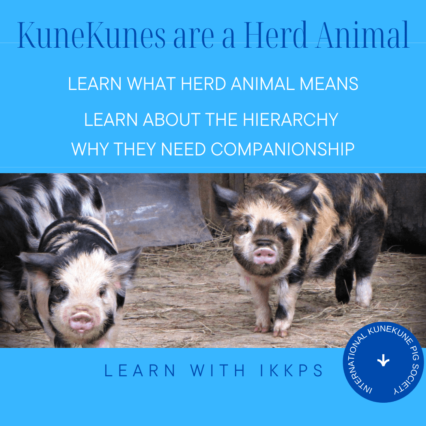
JOIN US
GET OUR KUNEKUNE
NEWSLETTER
New and highly discounted products, fresh and hot stories & useful information
What is a herd animal?
Herd Animals - KuneKunes are a herd animal
What is the social structure in a KuneKune herd?
What does a herd animal mean?
Why do KuneKune Pigs need another of their own kind to be happy?
Learn about KuneKunes being a herd animal and about their social side.

What does it mean when you hear KuneKunes are herd animals?
Are you thinking about getting a KuneKune? Do you have KuneKunes and need to move one to a new area? Why shouldn't KuneKune be alone?
First, it is important to under the social structure of KuneKune Pigs and second, their need to have companionship. This article explores the social structures within a herd of KuneKunes and why they do best with another of their own kind.
Introduction:
Are you considering adding KuneKunes to your property? First, this unique breed of pig can be an excellent addition to any farmstead. But, before you do, it is important to understand the herd animal trait of this breed. Herd animals are social creatures that rely on the protection of the group for their safety and security. So, in this blog post, we will explore the meaning behind keeping KuneKunes in a group. We will look at their natural instincts and behaviors, as well. We will explain what a herd animal is exactly.
Introduction to the KuneKune Pigs Social Side
First, KuneKunes have become a popular pig breed due to their social natures, not just with humans but, their fellow KuneKunes. It’s important to consider if KuneKunes are herd animals before getting just one. So, to answer this question, let’s explore the reasons why KuneKunes might be considered herd animals, the benefits of keeping them in a group setting, the hierarchy between members of a KuneKune herd.
Most importantly, the primary reason KuneKunes can be seen as herd animals is because they do best when kept in groups with similar age ranges. Although these smart and curious pigs can develop strong bonds with humans, they are still another of their own kind. Obviously, you cannot speak their language and KuneKune have many vocal "calls" and "sounds" when they speak to each other. Like humans, when the pigs are grazing out in the pasture, they will call to each other to make sure each other is okay.
Like some other domesticated animal herds—the relationship between members will usually consist of hierarchical roles depending on things like age or size which helps keep order while still allowing everyone ample room (or mud puddle!) to roam freely without excessive tension brewing over "turf wars" or constant scuffles trying figure out who takes charge every day--which may lead serious physical injury otherwise. Sows hold higher authority positions particularly to males which tend to be slightly submissive despite how outgoing/bold certain personalities may sound like whenever new herd members enter their domain unexpectedly!
Why do they need another of their own kind?
Obviously, you cannot be with them around the clock. In most cases--it's much easier for them to form deep relationships amongst themselves when living within their own species where they can understand each other better through body language and vocalizations without any difficulty communicating across distinct species barriers. Therefore, this means that ideally you would need at least two-to-three companions that make up their own little family group if you wish your pigs to be happiest!
It has been said that a single KuneKune will live up to 3 years less than one kept with other KuneKunes. Furthermore, keeping multiple KuneKunes together comes with many benefits such as increased stimulation and even help discourage your pig from becoming bored and finding fewer undesirable things to do like test fencing or root!
Keeping more than one KuneKune can reduce stress levels as compared to a single KuneKune. So, it could mean fewer visits to the vet over time! The main reason they are considered herd animals is because they prefer living in groups rather than alone. For Instance, they naturally seek safety within their herds enabling them to feel secure and safe from predators or any outside threats. Additionally, they rely on each other for social interaction and emotional comfort which helps build strong bonds between everyone in the group or “herd”. Living in a group or herd mimics their natural behavior. That natural behavior is why they are called herd animals. It is innate.
How does the Hierarchy Work between KuneKunes?
A hierarchical structure exists within each group depending on rank among the individuals. This means that individual KuneKunes have distinctive roles based on age and experience with the others in their herd dynamics which shifts accordingly through various phases of growth for the entire group. Adding in new individuals will consistently change the hierarchical structure each time a member leaves the group or comes into the group.
Let’s look at boars raised together for an example. The highest-ranking member is usually an alpha male who will lead his followers relying upon scent cues – sometimes he'll even vocalize commands and lead his followers along specific paths. Below him come beta males and leaders among smaller sub-groups before you get into general members of lower ranks much like any typical society structure would operate with us humans. This is the normal hierarchy of herd animals.
Inclusion:
KuneKunes are herd animals and keeping them in a group can provide benefits when kept in groups. There is a hierarchical structure within each group, as well as specific social behaviors exhibited by the animals. Furthermore, effective communication between multiple different KuneKune groups is also important to note. If you already own two or more, you will note they consistently “check” on the other when not visible through various sounds. By understanding these facts, people will gain insight into the social side of KuneKunes and be able to better appreciate this fascinating animal species and understand why they are considered a herd animal.
Registry Office
17500 Hamilton Arms Court Dewitt, VA 23840